INTERVIEW WITH PROF. DEBASHIS CHATTERJEE – DIRECTOR OF IIM KOZHIKODE ON HIS LATEST BOOK ‘THE CLASS ACT’
PART I OF THE INTERVIEW
(The interview was conducted by Milind Padalkar and Chacko Jacob, doctoral students of IIM Kozhikode.)
Interviewers: Sir, thank you indeed for agreeing to speak to us at a short notice. To begin with, what can you tell us about the genesis of the book?
The book arose out of my teaching career of 20 years. Teaching is a reflective art. In fact, it allows you a lot of reflective time. The book is an attempt to capture the nuances that a “career teacher” – if I may use the word – faces as he or she evolves in the craft of learning and teaching.
Interviewer: And what are some of the challenges one faces as a teacher? How does one pursue excellence in this craft and what are the aspects of discipline that one must practice to achieve excellence as a teacher?
I have tried in my own modest way, without any claims to being a great teacher or anything. I make no such claims. All I am doing is that I am putting a perspective. I am expressing an indebtedness that I have to my own teachers who have taught me how to not just teach but how to live. So I thought I will capture the essence of what the craft is about. What is getting lost in the euphoria of new age education is that teaching is still a craft that cannot completely be digitized. What can be digitized must be digitized. But teaching is a living experience, so it cannot be fully digitized. It has to be lived. And in order for this to be a ‘lived’ profession, it is very critical to have a set of values. Therefore this book tries to articulate, to put in perspective some of the critical values that make a teacher.
Interviewer: You speak of the civilizational DNA in your book. Can you explain this concept a little further?
DNA is a metaphor. In this case, I am not speaking of the biological DNA. Now if you ask me what is a DNA? In reality, what is a DNA biologically? DNA is no more than a door that opens you up to your potential. It’s like a switch board. The DNA switches you on to your potential. By itself, DNA is not the potential. It’s like… the switch board is not electricity. Electricity is switched on when you switch it on. All of us have a DNA for grey hair. When the switching mechanism for that pigment is switched off, then you have grey hair. Can you have grey hair at any age? No. But the potential for grey hair remains in all of us. It is just that the potential is switched on at a certain age based on your genetics, sort of predisposition and the stresses in your environment.
The point is that the teacher’s job is to open those doors. Switching on, discovering rather than adding, discovering the potential for learning, the potential for greatness that exists in all of us. Raising a person to his/her potential is fundamentally a teacher’s job. So when I say it transfers the DNA of the civilization, I simply mean that. The entire gamut of what it means to be an evolving human being.
As you can see, every species in the animal world goes through a certain learning incubation before the fledgling goes out and makes a living for itself. For humans, this gestation period is the longest. No other species teaches its young so much. That transfer of knowledge from one generation to another generation can only happen through a school system, rather through the teaching and learning processes. For us, the world is a complex place. That wisdom is already embedded in the human context. But the teacher actually opens the doors and tells you that you that you have it in you. The word “Guru” for me means G-U-R-U. The teacher is saying “Ji, you are you”. The teacher does not a follower. The teacher leads a leader. Such a commitment to human potential is very critical, before you can be called a teacher. And that is the role of a teacher, to connect a generation with its past and push it towards the future. If we are aware of that role of a teacher, we must dignify and honor the profession, restore the legitimate credit the teacher must be given, because sustaining a civilization is not easy. It carries an enormous responsibility. That is what this is about.
Interviewer: If I may expand on that topic a little, we hear about the clash of civilizations. We hear a lot of people talk of civilizations as if they were contesting entities. Whereas your view of a civilization is actually quite mellow, as if no contest is implied. Are we right in thinking like that?
At one level, civilizations are about material things. They are defined by artifacts. They are defined by what they stand for, in terms of processes, methods, structures. Under this view, the natural self of the human being is possessed by the juristic actors, the state, the enterprise, the society. These actors claim the natural self and civilize it, tame it in a manner so the human self fits into a particular mode. So by definition, civilizations will clash.
But if you look at a deeper aspect, civilization is also culture, human culture. Culture means something deeper. How do you look at the essence of who you are, how do you refine yourself, how do you evolve to a higher level of consciousness and perception? That is culture. And if you want to preserve the human culture and transfer the knowledge, then of course you have to go into civilization’s elements. So essentially when I talk about the DNA, I am referring to the human culture. For example, you may say that the British had a civilization. But India and Indians have a culture… a culture of knowing that the human being is the child of the immortal realm “Shrinwantu Vishwe, Amritasya Putra”. It means that there is an aspect of you which is infinite in dimension. But this is not easily accessible to the British, because their civilization is about table manners and all that. They did not know that India had such extraordinary culture, because at the civilization front, India wasn’t really polished.
So essentially what I meant by civilization is this, that you also transmit culture. You build confidence in the student about who he is. As far as the juristic actors, the enterprise, the state, the society will clog the child’s mind and life. But the teacher will prepare the child to face the challenges of life which are evolutionary in nature. For instance, if there is a loss in the family, how do you cope with such a loss? How do you cope with amelioration? How we cope with a very dysfunctional society? These are very important. You may be a giant in terms of creating wealth, even intellectual wealth, but you may be a moral pygmy.
Interviewer: In the book you make a powerful statement about teachers. You talk of motivating, awakening the brain, instilling confidence in the learner. And you use a nice term, the “learner” rather than the student. One could almost say that you are touching upon the art of ‘critical conversation’, to borrow a term from psychology. How is a modern teacher to learn this art of critical conversation?
First of all what do you mean by critical conversation? Let me understand that first.
Interviewer: Critical conversation is saying very little, but having a big impact. What we glimpse from the book is that the teacher says a few things and they have a momentous impact. While in other cases, you may surround the learner with a lot of words and it may have no impact.
You see the reason that these impacts happen is because of the consciousness behind the words and not the words per se. So if the words have the realization of the truth. For instance, just casually saying “you will be successful, go” is one thing, and saying “Go! You Will be successful” based on your appraisal of a person is quite another. There is a difference in consciousness. Do you really mean what you say? Aurobindo, one of the India’s greatest masters used to say “you must not speak anything that you don’t really mean”. That should be realized. If you really mean it, then you say. Once you consistently practice this, your words acquire the power and potency of realization rather than just a set of casual words. The way in which you utter those words, and the way in which you kind of commit yourself to the truth behind the words; that what makes the words powerful. It is this power that touches the people.
Even the teacher may not realize as to which word or phrase has touched the student. I had a student whose name is Jayaram. He was the director of Oracle worldwide based out of New York. He visited me after 15 years of having taught him. He comes and tells me, “sir, I took this class which you taught 15 years back.”. I said, “what do you remember of that course?”. He says just one phrase out of the whole 30 contact hours. So I said tell me the phrase. And he says the phrase is “matters of consequence”. You took a session called “matters of consequence” and that’s all I remember. He says, “I have applied that in my life”. I said that I am really happy to hear something like that but honestly, I don’t remember having taught this class. He says that he has the notes to prove that I have taught the class.
It’s not about saying things from your memory, so you may not remember what you said. But it is saying things from your being, there is a difference between the two. When you recall a word from memory and vomit it out, it has one kind of effect; but when the word comes from the depth of your realization of truth, it has another kind of impact. Learners go beyond the words. They sense the energy behind the words and that’s what connects. Words don’t connect.
Interviewer: you might say that the energy has a psychic quality to it?
No, energy is such that there is a quality of consciousness. You see when you casually say “something is hot”, that is one thing. When you consciously utter a word, you say “Its Hot!”. It is a realization, out of a simple experience. The consciousness and conviction behind the word makes it even more potent. We had this thought in India that “Mansa-Vacha-Karma” should be in alignment. When your mind, thought and actions are in alignment, is there is mindfulness behind the word, and there is mindfulness and word behind the action…
Words are very powerful. The word can penetrate layers of consciousness and can make an impact. Suppose I told you that the President of India will give you an award. Immediately those words will heighten your energy. In an instant. So you can see how much potency the words have
Teachers play with words. And they recognize, they ought to recognize that you can kill a students’ spirit by marks and remarks. That words can damn a student forever. Or lift a student forever. Either way it can happen, so have to be conscious of the words you use.
(To be continued and concluded in Part II)
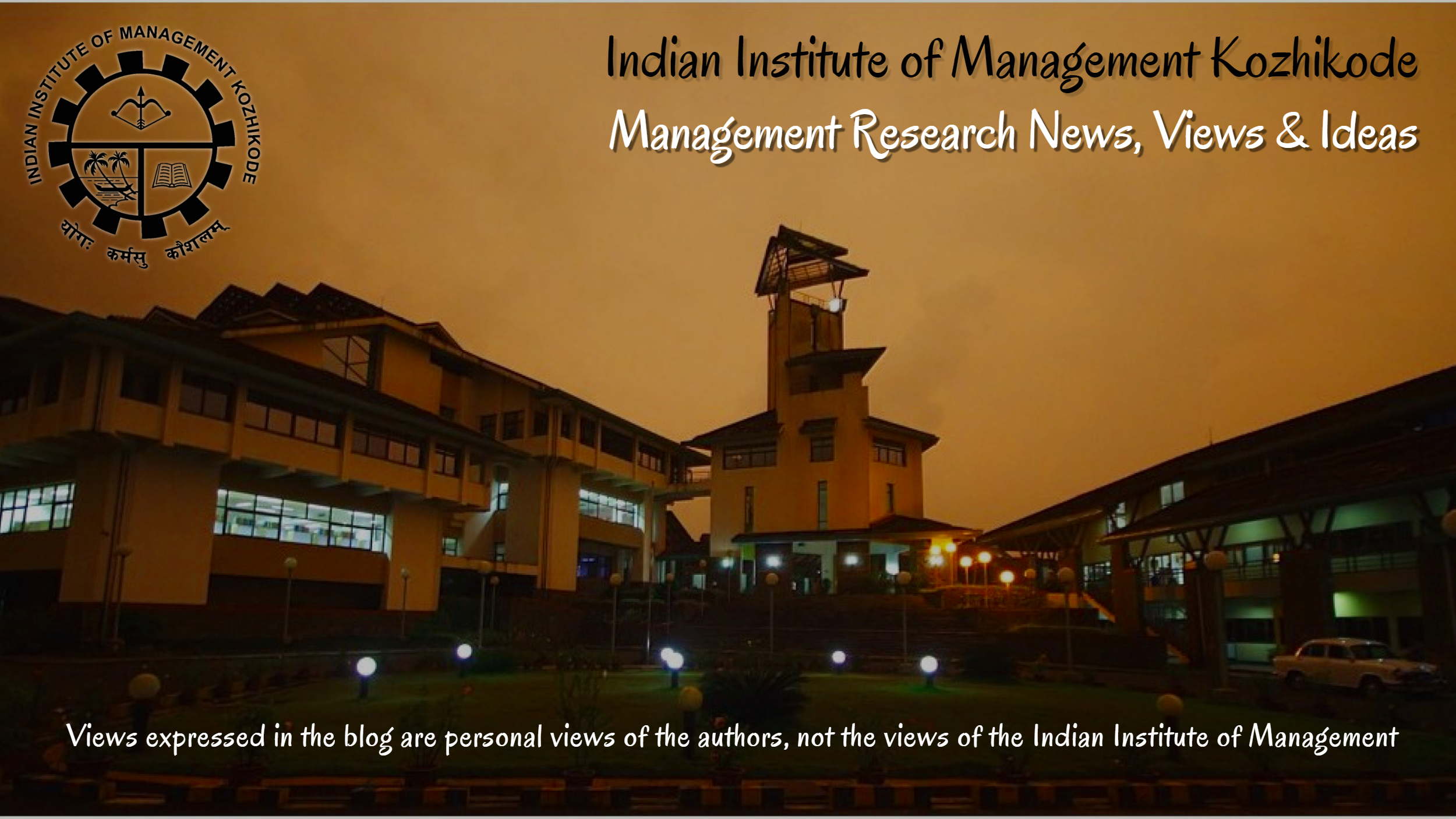



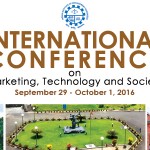
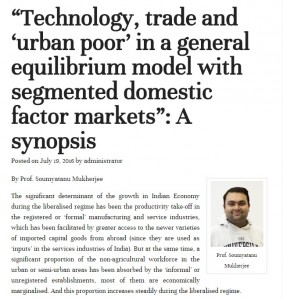
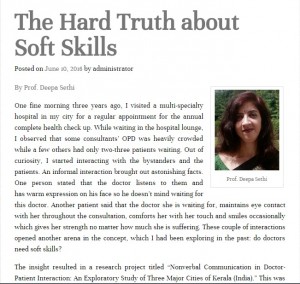
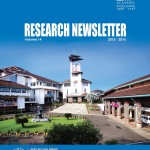

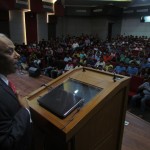
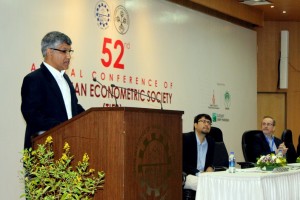
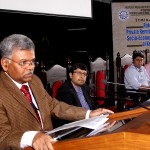
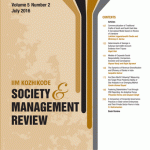





 Users Today : 30
Users Today : 30 Users Yesterday : 592
Users Yesterday : 592 This Month : 8419
This Month : 8419 This Year : 85291
This Year : 85291 Total Users : 509279
Total Users : 509279 Who's Online : 3
Who's Online : 3